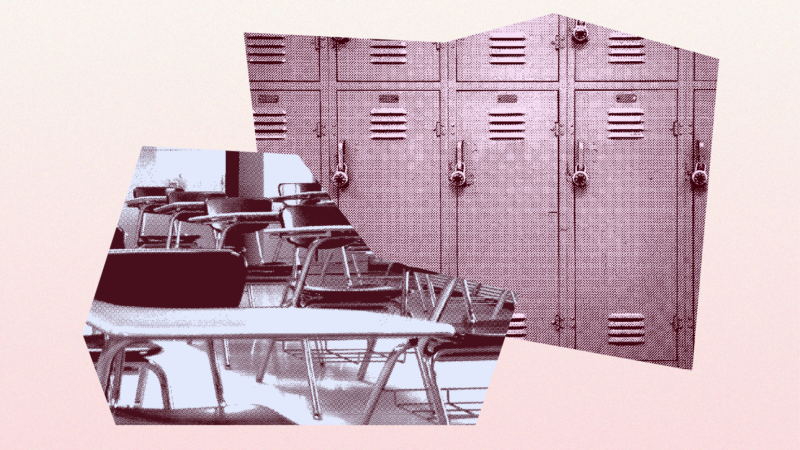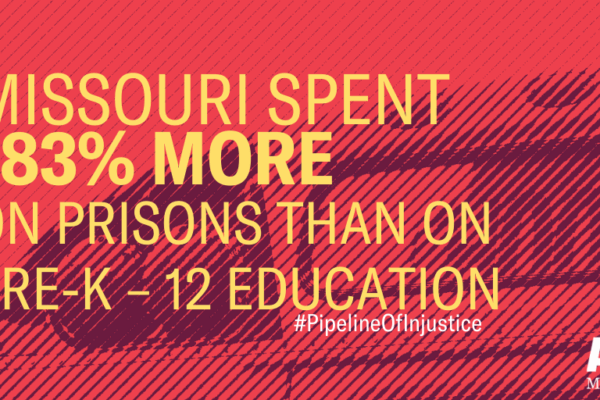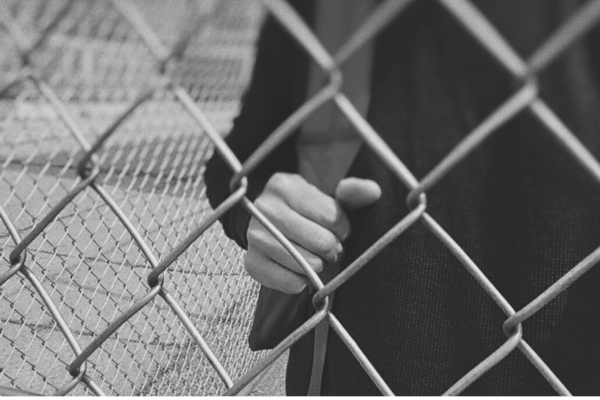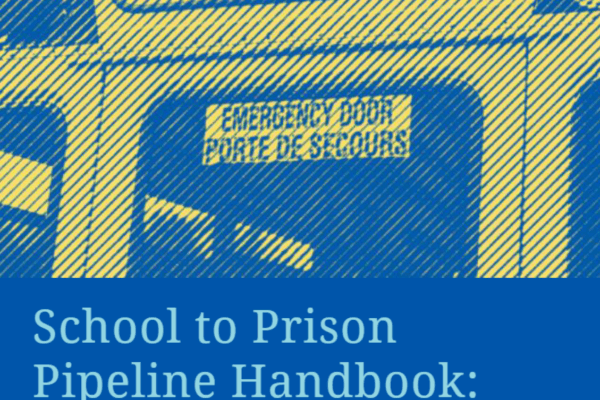School To Prison Pipeline
Missouri’s school discipline is inequitable. For years, the disproportionate discipline of students of color and students with disabilities has prevented these students from achieving their educational potential.

The ACLU of Missouri is committed to disrupting unjust suspensions and expulsions by challenging the policies and practices within public school systems and the juvenile justice system that contribute to the School to Prison Pipeline. The School to Prison Pipeline is the current system of funneling children out of public schools and into the juvenile and criminal justice systems. Students of colors and students with disabilities are often punished harsher than their peers leading to disproportionate disciplinary outcomes. Children should be educated, not incarcerated.
When it comes to zero-tolerance policies, they do not have one set definition but in theory mean that there is a harsh, pre-defined, and mandatory consequence to a given discipline infraction without considering situational contexts or extenuating circumstances. Zero-Tolerance Policies are never applied equally and further compound a system that is already ripe with disparities.
Data and research show zero-tolerance policies do NOT make school safer. However, the harm they cause through suspension and expulsion is real and leads to a greater risk for disengagement from school, dropping out, chronic underemployment, and future contact with the justice system. Through the years, zero-tolerance has become much broader in its application leading to more unjust suspensions and expulsions specifically for children of color, students with disabilities, English Language Learners, and LGBTQ+ students.
The K-12 setting has an extensive long history of using suspensions and expulsions as a means to remove students from the learning environment and force them into the juvenile justice system. As the data shows, the push for Zero-Tolerance Policies have exacerbated racial disparities in school discipline.
Racial Disparities in School Discipline:
- Black students are 3x more likely to be expelled than white students
- Black students are 4x more likely to face multiple suspensions than white students
- When looking at long-term suspension rates with zero-tolerance policies, Black students are at 11% compared to white students at 5.1%
- When looking at long-term suspension rates without zero-tolerance policies, for Black students that rate drops down to 8% and for white students down to 4%
Zero tolerance policies remove a student’s right to due process, a key principle in the Constitution. A system that incorporates due process in discipline matters would allow for the accused student to be informed of the alleged infraction, shown whatever information an official is acting upon, and provided an opportunity to present their story through evidence and witnesses. When students feel they are being treated fairly they are more likely to accept school policies and respect those who administer them, even if they disagree with the policy.
The Financial Burden of the School to Prison Pipeline
The consequences of excessive discipline extend far beyond the classroom, perpetuating cycles of poverty, low-education attainment, and structural inequalities that span generations. The school-to-prison pipeline is costly for taxpayers, too. It costs $89,170 a year to pay for one child in a juvenile justice facility, compared to $10,802 per in-school student.
Click Here To Access Our School to Prison Pipeline HandBook
This handbook is designed to move beyond the numbers and be a hands-on resource to advocates and administers alike who are committed to change.
To learn more about Zero Tolerance Policies check out these resources:
https://www.aclu.org/issues/juvenile-justice/school-prison-pipeline/school-prison-pipeline
https://www.aclu.org/other/dignity-denied-effect-zero-tolerance-policies-students-human-rights
https://www.aclusocal.org/en/zero-tolerance-policies
https://www.endzerotolerance.org
https://www.vera.org/downloads/publications/zero-tolerance-in-schools-policy-brief.pdf
https://www.air.org/resource/blog-post/zero-tolerance-and-bias-reinforce-school-prison-pipeline
The Latest

ACLU of Missouri and Partners Send Governor Parson and DESE Commissioner Recommendations To Use Educational Funding to Combat the School to Prison Pipeline.

Tracy Bono: Eliminating Prone Restraint, Isolation, And Seclusion In Our Schools.
Stay Informed
Sign up to be the first to hear about how to take action.
By completing this form, I agree to receive occasional emails per the terms of the ACLU’s privacy statement.
By completing this form, I agree to receive occasional emails per the terms of the ACLU’s privacy statement.


